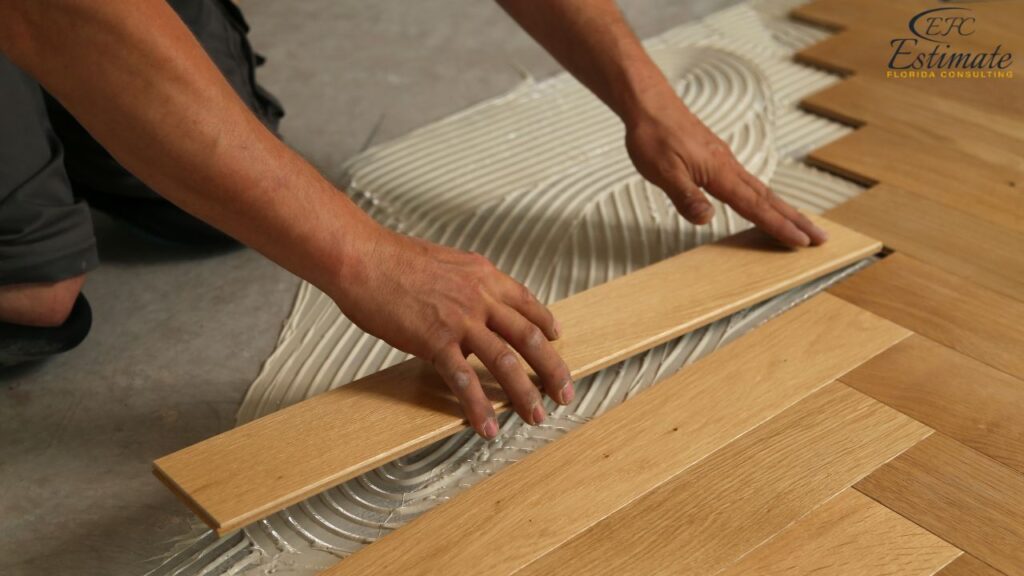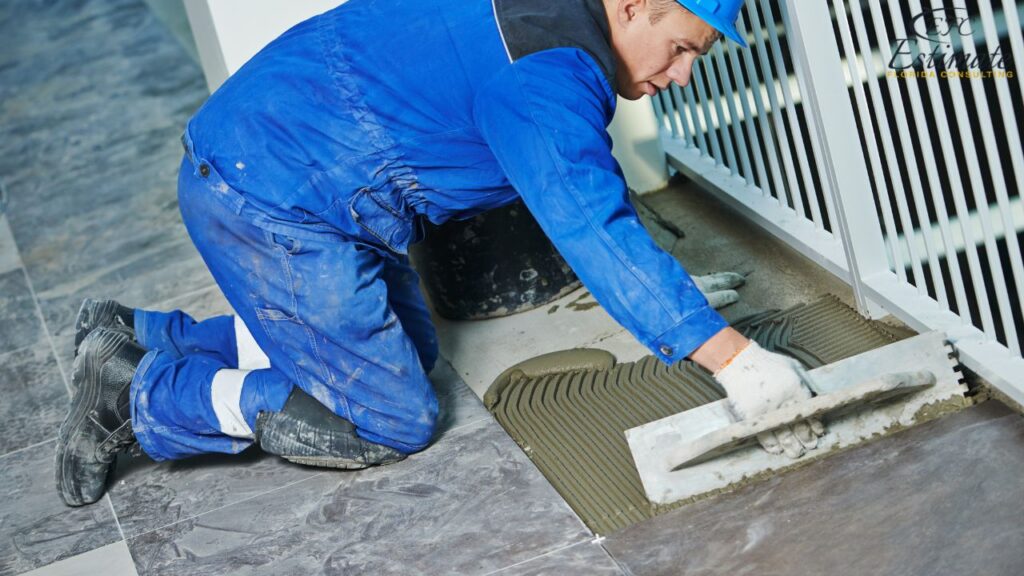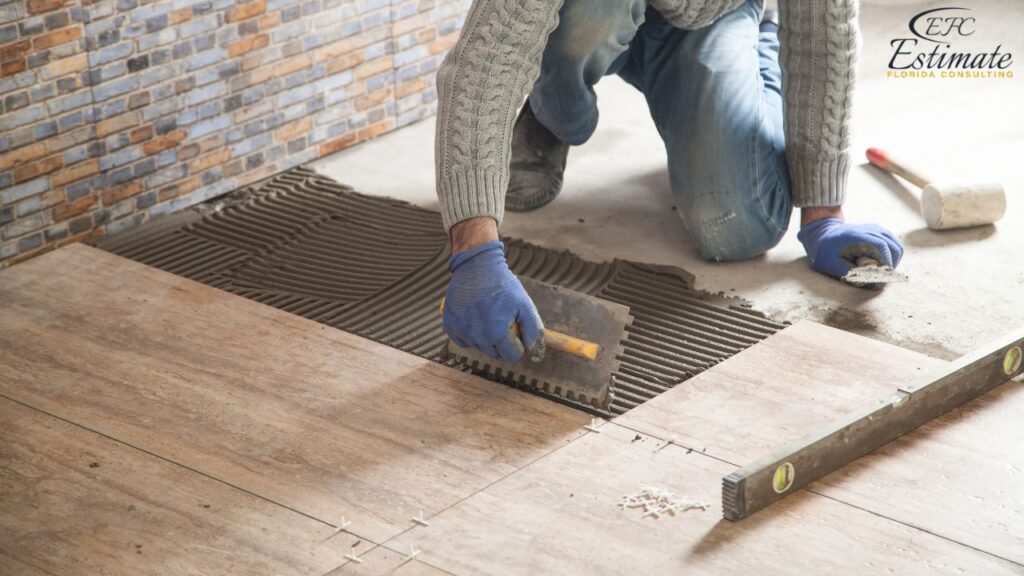How Much Do Most Contractors Charge to Lay Flooring?
Most contractors charge between $3 and $10 per square foot to lay flooring, depending on the material and complexity of the installation. For example, basic laminate or vinyl flooring may cost around $3 to $6 per square foot, while more intricate materials like hardwood or tile can range from $7 to $10 per square foot. Additional costs may include moving furniture, surface preparation, and waste removal. These rates usually cover both labor and materials, though it’s essential to get a detailed quote to account for any specific needs or potential extra charges.

Factors Influencing Flooring Installation Costs
Type of Flooring Material
The type of flooring material is the most significant factor affecting the cost of installation. Different materials have varying prices for both the product and the labor required to install them.
Flooring Type | Estimated Material Cost per Sq Ft | Estimated Installation Cost per Sq Ft | Total Cost per Sq Ft |
Hardwood | $7.80 – $15.60 | $5.85 – $11.70 | $13.65 – $27.30 |
Laminate | $2.60 – $7.80 | $3.90 – $9.10 | $6.50 – $16.90 |
Vinyl | $1.95 – $6.50 | $2.60 – $7.80 | $4.55 – $14.30 |
Tile | $6.50 – $13 | $6.50 – $13 | $13 – $26 |
Carpet | $3.90 – $9.10 | $3.25 – $7.80 | $7.15 – $16.90 |
Hardwood flooring tends to be the most expensive due to the cost of the material and the complexity of installation, which often involves precise cutting and fitting. Laminate and vinyl are more affordable options, both in terms of material and installation costs. Tile and carpet fall somewhere in between, with tile generally being more labor-intensive due to the need for grout and precise placement. Additionally, the durability and lifespan of each flooring type should be considered. While hardwood may have higher upfront costs, its longevity and classic appeal can provide greater value over time. On the other hand, laminate and vinyl offer easy maintenance and resistance to moisture, making them suitable for high-traffic or moisture-prone areas.
Size of the Area
The size of the area to be covered also impacts the total cost. Larger areas require more materials and labor, but the cost per square foot may decrease slightly with larger projects due to economies of scale.
Area Size | Estimated Total Cost for Hardwood | Estimated Total Cost for Laminate | Estimated Total Cost for Vinyl | Estimated Total Cost for Tile | Estimated Total Cost for Carpet |
100 sq ft | $1,365 – $2,730 | $650 – $1,690 | $455 – $1,430 | $1,300 – $2,600 | $715 – $1,690 |
500 sq ft | $6,825 – $13,650 | $3,250 – $8,450 | $2,275 – $7,150 | $6,500 – $13,000 | $3,575 – $8,450 |
1,000 sq ft | $13,650 – $27,300 | $6,500 – $16,900 | $4,550 – $14,300 | $13,000 – $26,000 | $7,150 – $16,900 |
Larger areas often have lower costs per square foot because contractors may offer bulk pricing or discounts for larger projects. However, it’s important to consider that more extensive areas will still result in higher total costs due to the increased amount of materials and labor required. Additionally, larger projects may require more planning and coordination, which can impact the timeline and logistics of the installation. Properly measuring and calculating the area ensures accurate estimates and helps avoid unnecessary costs. Homeowners should also consider the potential need for temporary relocation of furniture and other items during installation, which can add to the complexity and overall cost of the project.
Complexity of the Installation
The complexity of the installation can significantly influence the cost. Factors such as the condition of the subfloor, the layout of the room, and any custom designs or patterns can add to the overall expense.
Complexity Level | Additional Cost per Sq Ft | Description |
Simple Installation | $0 – $2.60 | Basic rectangular room, minimal cuts |
Moderate Installation | $2.60 – $5.20 | Irregular shapes, multiple rooms, some cuts |
Complex Installation | $5.20 – $7.80 | Custom patterns, stairs, intricate layouts |
Simple installations in straightforward, rectangular rooms are the least expensive. As the complexity increases, so does the labor cost. For example, installing flooring in rooms with many corners or custom designs will require more time and expertise, increasing the overall cost. Additionally, if the existing subfloor is damaged or uneven, repairs or leveling may be necessary before installation can proceed, adding to the complexity and cost. Complex patterns such as herringbone or chevron designs also require precise measurements and careful installation, which can significantly increase labor time and cost.

Homeowners should discuss any potential complexities with their contractor to ensure a comprehensive and accurate quote.
Additional Costs
Removal of Existing Flooring
Before new flooring can be installed, the old flooring often needs to be removed. This can add to the total cost, especially if the existing flooring is difficult to remove or dispose of.
Flooring Removal Type | Estimated Cost per Sq Ft |
Carpet | $1.30 – $2.60 |
Hardwood | $2.60 – $5.20 |
Tile | $2.60 – $5.20 |
Laminate/Vinyl | $1.30 – $2.60 |
The cost of removing existing flooring depends on the type of material and the difficulty of the removal process. Carpet and laminate/vinyl are generally easier and less expensive to remove, while hardwood and tile can be more labor-intensive and costly. Proper disposal of old flooring materials is also a consideration, as some materials may require special handling or disposal fees. Efficient removal and disposal methods can minimize disruptions and help maintain a clean and safe work environment. Additionally, removing old flooring may reveal hidden issues such as mold or rot, which will need to be addressed before new flooring can be installed. Homeowners should be prepared for these potential additional costs.
Subfloor Preparation
Proper preparation of the subfloor is essential for a successful flooring installation. This may involve cleaning, leveling, or repairing the subfloor to ensure a smooth and stable surface for the new flooring.
Subfloor Preparation Task | Estimated Cost per Sq Ft |
Cleaning | $0.65 – $1.30 |
Leveling | $1.30 – $3.90 |
Repairs | $2.60 – $6.50 |
Subfloor preparation is a critical step that can affect the durability and appearance of the new flooring. Neglecting this step can lead to issues such as uneven surfaces, squeaking, or premature wear of the flooring material. Investing in proper subfloor preparation ensures a long-lasting and high-quality flooring installation. A well-prepared subfloor can prevent potential problems such as moisture damage or structural instability, enhancing the overall performance and lifespan of the new flooring. It’s important to have a thorough inspection of the subfloor before beginning the installation to identify any necessary repairs or adjustments.

Underlayment
Some types of flooring require an underlayment, which is an additional layer installed between the subfloor and the new flooring. Underlayment can provide benefits such as sound insulation, moisture protection, and added comfort.
Underlayment Type | Estimated Cost per Sq Ft |
Standard | $0.65 – $1.30 |
Premium | $1.30 – $3.90 |
The cost of underlayment varies based on the type and quality. Standard underlayment provides basic cushioning and moisture protection, while premium options offer enhanced sound insulation, moisture resistance, and durability. Choosing the right underlayment can improve the performance and longevity of the new flooring. Premium underlayment options can also add a layer of comfort and reduce noise, making them ideal for multi-story homes or areas with heavy foot traffic. Properly installing underlayment can prevent issues such as floor creaking and moisture seepage, ensuring a solid and comfortable walking surface.
Download Template For Flooring Project Breakdown
- Materials list updated to the zip code
- Fast delivery
- Data base of general contractors and sub-contractors
- Local estimators

Tips for Managing Flooring Costs
Compare Quotes
Obtaining quotes from multiple contractors can help you find the best price and ensure you’re getting a fair deal. Be sure to compare not only the total cost but also the scope of work and the quality of materials included in each quote. Look for detailed breakdowns of labor and material costs to better understand where your money is going. It’s also beneficial to read reviews and ask for references to ensure the contractor has a good reputation for quality work. Negotiating with contractors can sometimes result in discounts or added value, such as free removal of old flooring or upgrades to better materials. Requesting detailed quotes and clarifying any uncertainties before starting the project can help prevent misunderstandings and ensure a smoother installation process.
Choose the Right Material
Selecting the right flooring material for your needs and budget is crucial. Consider factors such as durability, maintenance requirements, and aesthetic appeal. For example, while hardwood may offer a luxurious look, laminate or vinyl might provide similar aesthetics at a lower cost and with easier maintenance. Evaluating the specific needs of each room can help in choosing the most suitable material. For instance, moisture-resistant vinyl or tile may be better for kitchens and bathrooms, while carpet can add warmth and comfort to bedrooms and living areas. Researching different materials and their long-term benefits can help ensure you make an informed decision that meets both your functional and budgetary needs. Additionally, considering the potential impact on your home’s resale value can guide your choice of flooring material.
Plan for Additional Costs
Be prepared for additional costs that may arise during the project, such as subfloor repairs or unexpected challenges. Having a contingency budget can help you handle these expenses without disrupting your project. It’s also wise to discuss potential additional costs with your contractor upfront to avoid surprises later. Including a 10-20% buffer in your budget can provide a cushion for unexpected expenses and ensure that the project stays on track. Planning for additional costs also includes considering the long-term maintenance and potential future replacements, ensuring you choose materials and installation methods that offer the best value over time. Proactively addressing potential issues and maintaining flexibility in your budget can lead to a more successful and manageable flooring installation.
Get 5 New Leads Next 7 Days With Our System
- Multi-Family House
- Single-Faimly House
- Modern House
- Duplex
- Ranch House
- Bungalow
Conclusion
The cost to lay flooring varies based on the type of material, the size of the area, and the complexity of the installation. By understanding these factors and planning accordingly, homeowners can budget more effectively and achieve a successful flooring project. Whether you’re installing hardwood, laminate, vinyl, tile, or carpet, being informed about the costs and options available can help you make the best decisions for your home. Investing in quality materials and professional installation ensures a beautiful and durable floor that enhances the value and comfort of your home. Proper planning and budgeting can make the process smoother and more predictable, resulting in a high-quality installation that meets your needs and expectations. Additionally, taking the time to select the right contractor and thoroughly understanding the scope of work can prevent issues and ensure a successful outcome.
FAQs
The cost to install concrete steps typically ranges between
Most contractors charge between $3 and $10 per square foot to lay flooring. The cost varies depending on the type of material and the complexity of the installation. Basic laminate or vinyl flooring typically costs $3 to $6 per square foot, while hardwood or tile can range from $7 to $10 per square foot. These rates generally include both labor and materials, but it’s advisable to request a detailed quote to account for any additional charges such as furniture moving or surface preparation.
$5,850 and $19,825, which translates to approximately $15 to $45 per square foot. This includes materials, labor, site preparation, and finishing.
Several factors affect the cost of flooring installation:
- Type of Flooring Material: Different materials have varying costs for both the product and installation. For instance, hardwood is more expensive than laminate or vinyl.
- Size of the Area: Larger areas may have slightly lower costs per square foot due to economies of scale, but total costs are higher because more materials and labor are required.
- Complexity of Installation: Basic installations are cheaper than installations involving custom designs or irregular layouts.
- Additional Costs: These include removal of existing flooring, subfloor preparation, and underlayment.
The size of the area influences the total cost of flooring installation. Larger areas require more materials and labor, but costs per square foot may decrease slightly due to bulk pricing or discounts for larger projects. However, homeowners should expect higher overall costs for larger areas.
Installation complexity depends on factors such as the condition of the subfloor, room layout, and any custom designs or patterns. Basic installations in simple, rectangular rooms are least expensive, while complex layouts or intricate designs increase labor costs significantly.
Additional costs may include:
- Removal of Existing Flooring: Costs vary depending on the type of flooring being removed.
- Subfloor Preparation: Cleaning, leveling, or repairing the subfloor ensures a smooth installation surface.
- Underlayment: Some flooring types require an additional underlayment for added insulation or moisture protection.
To manage costs effectively:
- Compare Quotes: Obtain multiple quotes to ensure competitive pricing and understand what is included.
- Choose the Right Material: Consider durability, maintenance, and aesthetic appeal when selecting flooring materials.
- Plan for Additional Costs: Have a contingency budget for unexpected expenses like subfloor repairs or unforeseen challenges.
Homeowners should:
- Plan Ahead: Research materials, obtain quotes, and plan for potential additional costs.
- Select a Contractor: Choose a reputable contractor based on reviews and references.
- Understand the Scope: Ensure clarity on what is included in the quote and any potential extra charges.
Google Reviews



Process To Get Flooring Cost Estimate Report
Here I am going to share some steps to get flooring cost estimate report.
-
You need to send your plan to us.
You can send us your plan on info@estimatorflorida.com
-
You receive a quote for your project.
Before starting your project, we send you a quote for your service. That quote will have detailed information about your project. Here you will get information about the size, difficulty, complexity and bid date when determining pricing.
-
Get Estimate Report
Our team will takeoff and estimate your project. When we deliver you’ll receive a PDF and an Excel file of your estimate. We can also offer construction lead generation services for the jobs you’d like to pursue further.

